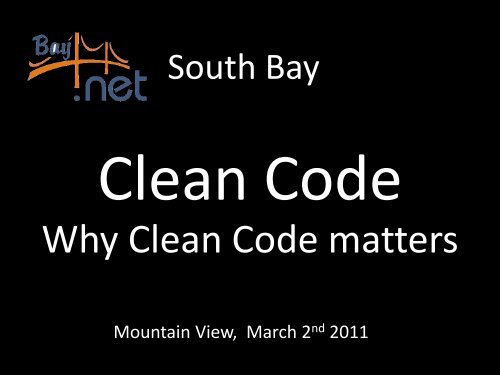You also want an ePaper? Increase the reach of your titles
YUMPU automatically turns print PDFs into web optimized ePapers that Google loves.
South Bay<br />
Clean Code<br />
Why Clean Code matters<br />
Mountain View, March 2 nd 2011
Theo Jungeblut<br />
• Senior Software Developer at<br />
Omnicell Inc. in Mountain View<br />
• Has been designing and<br />
implementing .NET based<br />
applications , components and<br />
frameworks for 8 years<br />
• Previously worked in factory<br />
automation with focus on<br />
component based software and<br />
framework development for 3 ½<br />
years<br />
• Degree in Software Engineering<br />
and Network Communications<br />
theo@csharp-lighthouse.com<br />
www.csharp-lightouse.com
Overview<br />
• Why Clean Code<br />
• Tools<br />
• Resharper<br />
• FxCop, StyleCop & StyleCop plugin for Resharper<br />
• GhostDoc & Spell Checker<br />
• Code Contracts, Pex & Moles<br />
• Clean Code Developer Initiative<br />
• Principles and Practices<br />
• Code Comparison<br />
• Q&A
Does writing Clean Code<br />
make us more efficient?
What is Clean Code?
http://www.technicopedia.com/8865.html
http://www.technicopedia.com/8865.html
http://technicbricks.blogspot.com/2009/06/tbs-techpoll-12-results-2009-1st.html
.NET Tools and their Impact<br />
Tool name Positive Impact Negative Impact<br />
Resharper compiling -- -- -- VS responsiveness --<br />
FxCop code quality +++ compiling +<br />
StyleCop code quality compiling +<br />
StyleCop plugin<br />
for Resharper<br />
compiling --- VS responsiveness --<br />
Ghost Doc automated docs potentially worse doc<br />
Spell Checker fewer spelling errors performance --<br />
Code Contracts testability, quality +++ compiling ++<br />
Pex & Moles automated test limited
Features:<br />
– Code Analysis<br />
– Code Templates<br />
– Code Generation<br />
– Code Cleanup<br />
Resharper<br />
“The single most impacting development<br />
addition to Visual Studio”<br />
– Many, many more…<br />
http://www.jetbrains.com/resharper/
FxCop / Code Analysis<br />
Static Code Analysis:<br />
– Correctness<br />
– Library design<br />
– Internationalization and localization<br />
– Naming conventions<br />
– Performance<br />
– Security
• Design-by-Contract programming<br />
• Improved testability<br />
• Static verification<br />
• API documentation<br />
http://msdn.microsoft.com/en-us/devlabs/dd491992
Method Overview<br />
Code Contracts User Manual, 5.3 Contract Ordering, page 22
Runtime Checking Levels<br />
Code Contracts User Manual, 6.2.1 Runtime Checking Level, page 24
Code Contracts User Manual,<br />
5.1 Argument Validation and<br />
Contracts, page 18<br />
Argument Validation
Microsoft Pex & Moles<br />
• Pex automatically generates test suites with<br />
high code coverage.<br />
• Moles allows to replace any .NET method with<br />
a delegate.<br />
http://research.microsoft.com/en-us/projects/pex/
Ghost Doc<br />
• Save keystrokes and time<br />
• Simplify documenting your code<br />
• Benefit of the base class documentation<br />
http://submain.com/products/ghostdoc.aspx
Spell Checker<br />
• Spelll chicking for texts and comments in VS<br />
http://visualstudiogallery.msdn.microsoft.com/7c8341f1-ebac-40c8-92c2-476db8d523ce/
Graphic by Michael Hönnig http://michael.hoennig.de/2009/08/08/clean-code-developer-ccd/
Keep it simple, stupid<br />
(KISS)
Graphic by Nathan Sawaya courtesy of brickartist.com
Don’t <strong>repeat</strong> <strong>yourself</strong><br />
(DRY)
Separation of Concerns (SoC)<br />
Single Responsibility Principle (SRP)
Component-Oriented<br />
Programming<br />
(CoP)
Dependency Inversion Principle<br />
(DIP)
S<br />
O<br />
L<br />
I<br />
D<br />
Single Responsibility Principle<br />
Open/Closed Principle<br />
Liskov Substitution Principle<br />
Interface Segregation Principle<br />
Dependency Inversion Principle<br />
Robert C Martin: http://butunclebob.com/ArticleS.UncleBob.PrinciplesOfOod
Source Code Conventions
Let’s switch to the code
Summary Clean Code<br />
Being more efficient through:<br />
• Simplification and Specialization<br />
(KISS, SoC, SRP)<br />
• Decoupling<br />
(Contracts, CoP, IoC or SOA)<br />
• Avoiding Code Blow (DRY, YAGNI)<br />
• Quality through Testability<br />
(all of them!)
Q & A<br />
Graphic by Nathan Sawaya courtesy of brickartist.com
Resharper<br />
http://www.jetbrains.com/resharper/<br />
References<br />
FxCop / Code Analysis<br />
http://msdn.microsoft.com/en-us/library/bb429476(VS.80).aspx<br />
http://blogs.msdn.com/b/codeanalysis/<br />
http://www.binarycoder.net/fxcop/index.html<br />
Code Contracts<br />
http://msdn.microsoft.com/en-us/devlabs/dd491992<br />
http://research.microsoft.com/en-us/projects/contracts/<br />
Pex & Mole<br />
http://research.microsoft.com/en-us/projects/pex/<br />
StyleCop<br />
http://stylecop.codeplex.com/<br />
StyleCop Plugin for Resharper<br />
http://stylecopforresharper.codeplex.com/<br />
Ghostdoc<br />
http://submain.com/products/ghostdoc.aspx<br />
Lego (trademarked in capitals as LEGO)
goto<br />
www.csharp-lighthouse.com<br />
for<br />
slides & code examples


